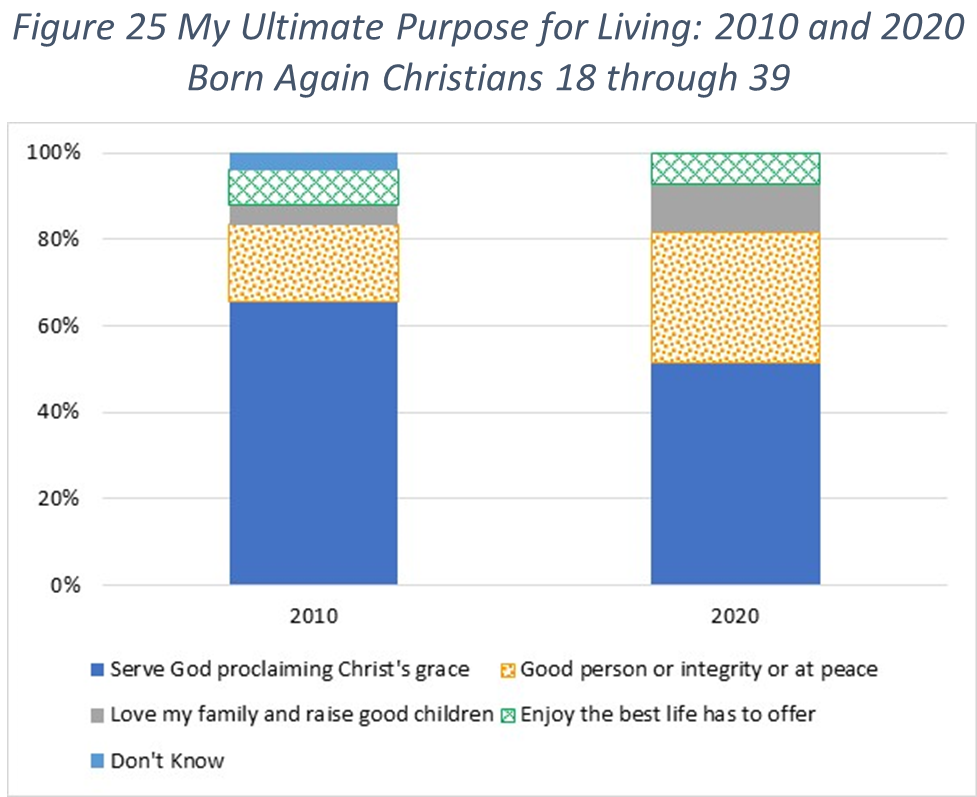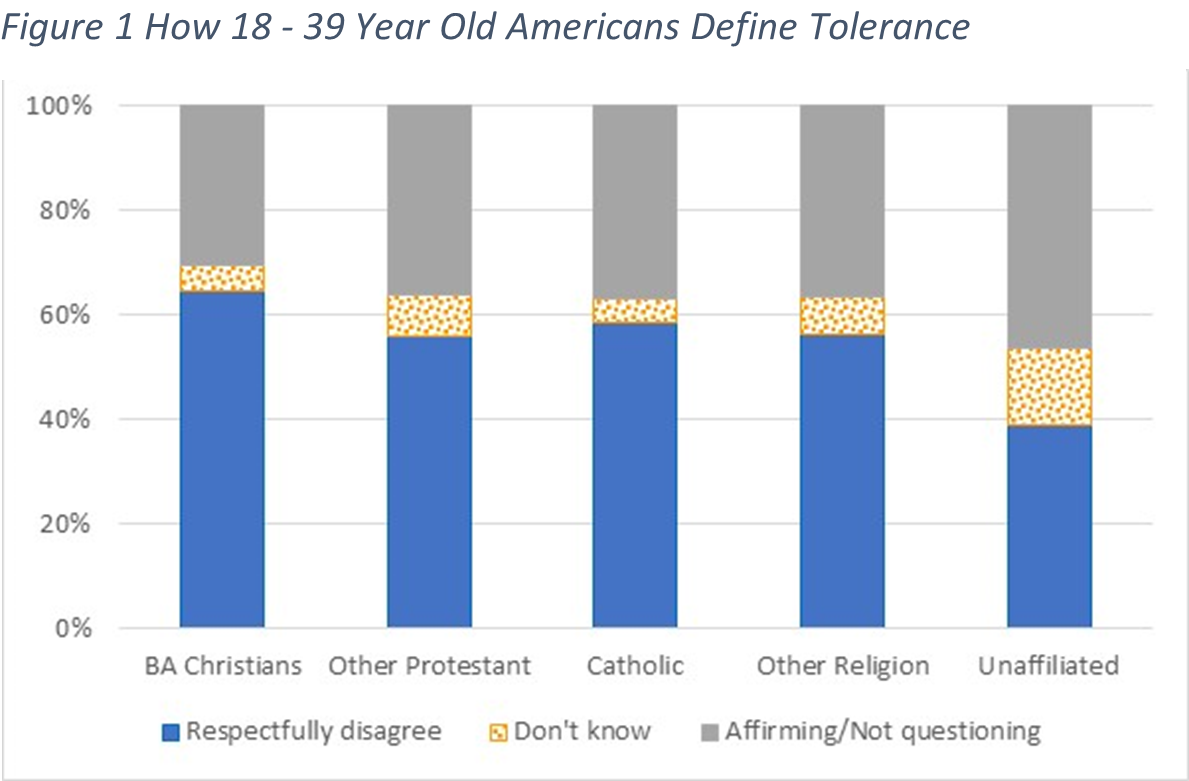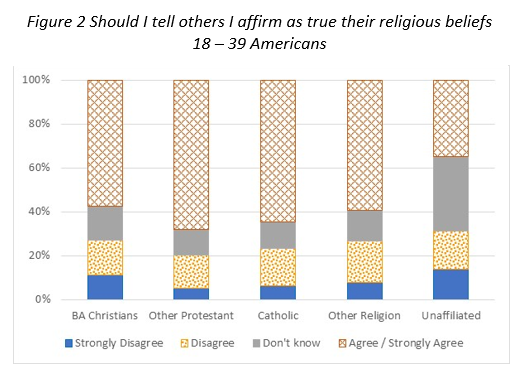Tom Davis explores how recovering the practice of classic spiritual disciplines can enhance believers’ relationship with God and our impact on the world around us.
There is a loss of spiritual knowledge of the truth of Christianity and how we live in light of that truth. This loss of spiritual knowledge is the result of shifts in cultural attitudes toward faith, happiness, ethics, freedom, and tolerance. The answer to the loss of spiritual knowledge is a return to the practice of spiritual disciplines. After examining the benefits of suffering and the disciplines of study, prayer, and fasting, I will show how these disciplines restore spiritual knowledge in society.
Loss of Spirituality
Today’s society is in spiritual turmoil. Most people are not knowledgeable about spiritual things. The National Study of Youth and Religion indicates that the Church has become less influential in the lives of people. The effects of modernity and post modernity have created a popular culture that is suspicious of any claim to objective religious knowledge and any idea of an authoritative source of information concerning spiritual issues. Christian Smith writes, “In this culture religion lost, at least in theory, any remaining principled, authoritative standing to make truth claims that it has enjoyed in previous eras of history.”{1}
Basically, this means that most people have adopted a mindset that says, “You can’t know anything for sure about religion. And if you think you do, you’re an arrogant bigot.”
Five Steps to Spiritual Death
In his book, Kingdom Triangle, Biola professor and theologian J.P. Moreland claims that there are five cultural shifts that have contributed to today’s state of spirituality in the culture. The first shift separates knowledge from faith.{2} All spiritual beliefs are considered valid because they are not real knowledge. Many people think that all religions lead to the same God. They say that we should not criticize other religions because they call God by a different name or hold different theological beliefs. These things are a matter of faith, not knowledge. This kind of attitude relegates all things spiritual to the subjective arena of faith. The things of the spirit are relegated to the “upper story” of faith. Real knowledge only exists in the “lower story” of the academic disciplines.{3} The result of this view of faith is that spirituality becomes something that is neither true nor false. Separating faith and knowledge ultimately leads to a denial of spiritual truth.
The second shift is the definition of happiness.{4} In the Bible happiness is portrayed as part of a right relationship with God. To live the good life meant that a person had intellectual and moral virtue. God created people to live well according to what they were created to be. J.P. Moreland explains, “So understood, happiness involves suffering, endurance, and patience because these are important means to becoming a good person.”{5} The pressure of modernism and postmodernism has changed this view. Happiness is now associated with pleasure. Television commercials promise to deliver happiness through the next fad diet that will increase your sex appeal. Male enhancement drugs promise to give men happiness by giving them back their youth and an increased sex drive. Happiness can be achieved by buying the newest car, toy, accessory, or a trip to an exotic place or amusement park. The good life now means having fun and collecting things so that you can feel good.
The third shift that Moreland notes is a shift from duty and virtue in morality to a minimalist view of ethics.{6} Previously, moral knowledge was viewed as an objective set of propositions about right or wrong, or good and evil. It used to be that everyone would agree it was always wrong to torture and kill small children. Now moral knowledge is viewed as subjective feelings or opinions. This change can be seen if we look at the language we use when making moral statements. People used to say things like, “I know,” or “I think that this is the right thing to do.” Now we say, “I felt that it was right for me to do this.”
Duty to one’s society used to be viewed as an essential part of a moral life. People were expected to help their neighbor. If an old lady was trying to cross the street, young men were expected to help her. Now, as long as they do not push the old lady into traffic, or rob her, the young men are considered to be moral. This change is the result of culture. People are no longer expected to contribute to their society. As long as people are not hurting anyone else, they are now considered to be moral. This view of morality changes a person’s view of life. Life is now about having the most fun without harming anyone. Life used to be about living for something bigger than the individual. People used to live for God and country. Now people live for themselves and their own pleasure.
The fourth shift is in how people view freedom.{7} Freedom used to mean that people could live the way they ought to live. People were free to do what was right without government interference. Now freedom means the right of people to do what they want, when they want. Popular culture says that as long as you do not hurt anyone you can do what you want.
The last shift that Moreland notes is a shift in the meaning of tolerance.{8} Classic tolerance is when people will allow others to be, do, or believe differently than they do, even though one person thinks that the view of another person is wrong. People were allowed to critique the views of other people, but respect for the other person was still maintained. Contemporary tolerance is the view that people are not allowed to critique another person’s beliefs. People are no longer allowed to say that someone is wrong. This attitude ends all public discussion. Every idea must be tolerated, except ideas that claim that other ideas are wrong. Ironically, the new tolerance fails its own definition of tolerance because they do not tolerate intolerance.
Returning to Spiritual Health
The popular culture has raised five strongholds against the knowledge of God: separation of faith and knowledge, a self-centered view of happiness, a minimal view of ethics, a new view of freedom, and a new view of tolerance. How are Christians to respond to this? Paul writes, “For the weapons of our warfare are not of the flesh but have divine power to destroy strongholds. We destroy arguments and every lofty opinion raised against the knowledge of God and take every thought captive to obey Christ” (2 Corinthians 10:4-5). Christians must recapture our spiritual disciplines.
Theology, the Intellect, and Spirituality
The first thing that needs to be addressed is that Christians need a renewed interest in theology. J. I. Packer, while discussing the influence of the Puritans in his life, writes, “All theology is also spirituality, in the sense that it has an influence, good or bad, positive or negative, on its recipient’s relationship or lack of relationship to God.”{9} Theology comes from two Greek words. Theos is the Greek word for God; logos is the Greek word for logic. Theology can be understood as the logic, or science of God.{10} Spirituality, in the Christian context, is a person’s relationship with God. In order to claim to have a relationship with God a person has to have knowledge of who God is. It would be odd to have a man talk about having a relationship with a woman and then say he does not know her and has never met her. The concept of a relationship presupposes that each party in the relationship has knowledge of the other party.
The Bible and Books
An essential step to gaining spiritual knowledge is a disciplined approach to reading the Bible. Billy Graham addresses the importance of studying the Bible: “Your spiritual life needs food. What kind of food? Spiritual food. Where do you find this spiritual food? In the Bible, the Word of God.”{11} Paul writes, “All Scripture is inspired by God and is useful for teaching, for reproof, for correction, and for training in righteousness, so that the person of God may be proficient, equipped for every good work” (2 Timothy 3:16-17). God gave the Bible to people so that people can learn about God. By studying the Bible a person will gain knowledge about God and strengthen that person’s relationship with God.
Christians should also read other books. The Bible contains essential information for salvation and knowing God. However, the Bible is not exhaustive in its knowledge. Christians can grow intellectually and spiritually by gaining knowledge about God’s creation. David Naugle, head of the philosophy department at Dallas Baptist University, sums up the impact of books on his life: “I have sought and still seek to be a person of the Book and of books, that I might know God and more and more about his world in the context of faith.”{12} The study of the disciplines of theology, philosophy, the humanities, and the sciences helps people develop a coherent worldview. A worldview gives people the ability to understand the world through the corrective lens of the knowledge of God.
The medieval priest Thomas à Kempis advises, “If you would profit from it, therefore, read with humility, simplicity, and faith, and never seek a reputation for being learned. Seek willingly and listen attentively to the words of the saints; do not be displeased with the saying of the ancients, for they were not made without purpose.”{13} We grow intellectually and spiritually when we read the books of others. We gain insight to their wisdom. We should humbly read the books written by the ancient teachers. They left their wisdom in writing so that we can learn from them.
Suffering
Contemporary society thinks that suffering should be avoided at all costs. However, suffering can have a good outcome. Paul writes, “More than that, we rejoice in our suffering, knowing that suffering produces endurance, and endurance produces character, and character produces hope” (Romans 5:3-4). When we suffer, we can learn to endure. Our endurance produces character–that is, we mature and learn to trust God. God is the only hope that will never fail. Matthew Henry writes, “He who, being thus tried, comes forth as gold, will thereby be encouraged to hope.”{14} When soldiers train, they punish their body; they suffer. Their suffering in training makes them better soldiers in combat because their suffering has made them stronger and given them more endurance. As a Navy veteran, I know this is true personally.
Prayer
Prayer is the spiritual discipline of talking to God. God speaks to us in the Bible like the way people communicate through writing letters; the communication is one way. Praying is more like a discussion between two people. In prayer we get to talk with God.
Paul told the church at Thessalonica to “pray without ceasing” (1 Thessalonians 5:17). The best way to start a disciplined prayer life is to pray every day. This is easier if we begin each day with prayer. J. P. Moreland writes, “When you get up in the morning, start off with praise and thanksgiving to God for the things you honestly appreciate about him and his dealings with you. Then lift your burdens to him until you have a sense of rest before the Lord.”{15} By beginning each day with prayer we turn our minds and our hearts toward God and His will. Each day is a new opportunity to minister to someone in need. Our prayers will give us spiritual discernment so that we can recognize those in need. Our minds will also be turned towards God and the things of heaven, and we can continue to keep these things in our minds throughout the day.
John Calvin used four rules for prayer. First, we must “have our heart and mind framed as becomes those who are entering into converse with God.”{16} We must prepare ourselves to pray. Minds that are distracted do not make for good conversation. This is no ordinary conversation. People prepare themselves for meeting with important people. We should be prepared to open our hearts and minds to God when we pray. We should be aware that we are praying to our God, but that this God loves us and wants to bring our concerns to Him. Paul writes, “Do not be anxious about anything, but in everything by prayer and supplication with thanksgiving let your request be made known to God” (Philippians 4:6). We should not be anxious when praying because we know that God cares for us and can do all things. We should pray about all our concerns. Our prayers should be full of worship, thanking God for all that He has done.
One way to prepare to pray is to remember what David Naugle calls the “Three P’s.” These are “(1) my purpose, or what I would live my life for, (2) my profession, or what I would spend my life doing, and (3) my partner, or who I would spend my life with.”{17} David Naugle’s “Three P’s” cover the most important decisions we will make in our lives. Our purpose fills our life with purpose. We should pray for purpose so that God will align what we want our purpose in life to be with what He wants our purpose in life to be. Our profession is where we fulfill our purpose. A car mechanic can glorify God in fulfilling his purpose to be God’s representative in the auto shop. Our spouse is our ministry partner. Husbands and wives are not separated from each other. They share each other’s joys and burdens. Praying for these things will focus our minds on what is important and orient our hearts toward living a life pleasing to God.
John Calvin’s second rule is “That in asking we must always truly feel our wants, and seriously considering that we need all the things which we ask, accompany the prayer with a sincere, no, ardent desire of obtaining them.”{18} Our requests should be things that we truly want or need. When we pray for the wants and needs of others, we should try to feel their desire for the request so that we can better minister to them through prayer. James tells us, “Is anyone suffering? Let him pray. Is anyone cheerful? Let him sing praise” (James 5:13). We should be honest and sincere in our requests and in our thanksgiving. A sincere prayer would be praying for a loved one to get well when they are sick. An insincere prayer might look like praying for a job promotion when you know that you have not been putting your best effort into the job.
Third, “discard all self-confidence, humbly giving God the whole glory.”{19} When we pray, we should realize who we are, and who God is. Jesus said, “And when you pray, you must not be like the hypocrites. For they love to stand in the synagogues and at the street corners so that they may be seen by others” (Matthew 6:5). The hypocrites’ motivation to pray in the street corners was so that people would see them and think that these people were righteous. Jesus makes this point with more clarity in the parable of the Pharisee and the tax collector:
Two men went up into the temple to pray, one a Pharisee and one a tax collector. The Pharisee, standing by himself prayed thus: “God, I thank you that I am not like other men, extortionist, unjust, adulterers, or even like this tax collector. I fast twice a week; I 9give tithes of all that I get.” But the tax collector, standing far off, would not even lift up his eyes to heaven, but beat his breast, saying, “God, be merciful to me, a sinner!” (Luke 18:10-13)
The Pharisee came to God in prayer thinking that he was righteous and better than other men. He even pointed out his fasting and tithing as if God should be impressed with these things. The tax collector was humbled in the presence of God. He would not look up to heaven because he understood that he was guilty before God. The tax collector prayed sincerely for mercy. Asking God for mercy gives God glory and humbles the person.
John Calvin’s fourth rule of prayer is, “We should be animated to p-ray with the sure hope of succeeding.”{20} God is all powerful, able to meet our every need. Jesus teaches this same principle, “Ask, and it will be given to you; seek, and you will find; knock, and it will be opened to you. For everyone who asks receives, and the one who seeks finds, and to the one who knocks it will be opened” (Matthew 7:7-8). By grace we have been made children of God. If we ask, God will give us what we need. When we humble ourselves before God, He will be merciful. God knows what we need and will give us what is good for us. Jesus said, “If you then, who are evil, know how to give good gifts to your children, how much more will your Father who is in heaven give good things to those who ask him” (Matthew 7:11).
Through our prayer life we should conform to the image of God revealed in Jesus. Andrew Murry taught:
And of all the traits of a life like Christ there is none higher and more glorious than conformity to Him in the work that now engages Him without ceasing in the Father’s presence His all-prevailing intercession. The more we abide in Him, and grow unto his likeness, will His priestly life work in us mightily, and our life become what His is, a life that ever pleads and prevails for men.{21}
Our prayers should make us more Christlike. By praying, we conform to God’s will. Christ makes intercessions to the Father for us. We have the privilege of making intercessions to Christ for others.
Fasting
Dietrich Bonhoeffer writes, “Strict exercise of self-control is an essential feature of the Christian’s life.”{22} One way to exercise self-control is by abstinence (saying no to ourselves by not doing something we want). Fasting is one of the most difficult abstaining disciplines. Calvin defines fasting as “when we retrench somewhat from our accustomed mode of living, either for one day or a certain period, and prescribe to ourselves a stricter and severer restraint in the use of that ordinary food.”{23} In short, fasting is abstaining from food for a short period of time.
Jesus taught:
When you fast, do not look gloomy like the hypocrites, for they disfigure their faces that their fasting may be seen by others. Truly, I say to you, they have their reward. But when you fast, anoint your head and wash your face, that your fasting may not be seen by others but by your Father who is in secret. And your Father who sees in secret will reward you (Matthew 6:16-18).
Fasting is to be done in secret. Again, Jesus points to the hypocrite, who wants to gain a reputation from his spiritual discipline. Jesus taught that people would be rewarded by not making a spectacle out of their spirituality.
What is the goal of fasting? Augustine taught, “While we live in the temporal order, we must fast and abstain from the enjoyment of what is temporal, for the sake of the eternity in which we desire to live.”{24} Fasting reminds Christians that they do not depend on temporal things. God wants Christians to rely on Him to supply our needs. In a world where tight schedules are kept and frivolous distractions are available everywhere, it can be easy to forget God. Fasting emphasizes the importance of a right relationship with the world by abstaining from the sustenance of food. John Calvin lists three goals for fasting: “We use it either to mortify and subdue the flesh, that it may not wanton, or to prepare the better for prayer and holy meditation; or to give evidence of humbling ourselves before God, when we would confess our guilt before him.”{25} Many times the flesh (the part of us that operates independently from God, either in active rebellion or passive indifference) will want to rebel against the spirit. Fasting deprives the flesh of sustenance and weakens it. The spirit can then rule the flesh. There are times when a Christian will need to place special focus on prayer and meditation. Fasting is one way to prepare the spirit for these activities.
Reversing the Shifts
In our contemporary culture faith is viewed as being completely separate from knowledge. This faulty view originates within Christianity with the ideas of some Christian philosophers and theologians. Soren Kierkegaard saw faith as “the highest passion in a human being.”{26} He applies this view to Jesus: “The proofs which Scripture presents for Christ’s divinity—His miracles, His resurrection from the dead, His ascension into heaven–are therefore only for faith, that is, they are not ‘proofs,’ they have no intention of proving that all of this agrees perfectly with reason: on the contrary they would prove that it conflicts with reason and therefore is an object of faith.”{27} Kierkegaard believed that Jesus lived and died and rose from the dead. But he thought that Jesus was unknowable through knowledge and reason. One could only know Jesus through faith, and that meant that faith was opposed to knowledge and reason.
When writing to Theophilus, Luke says, “Just as those who from the beginning were eyewitnesses and ministers of the word have delivered them to us, it seemed good to me also, to write an orderly account for you” (Luke 1:2-3). John writes “That which we have seen and heard we proclaim to you” (1 John 1:3). The New Testament authors were writing about what they knew. These men walked, talked, and ate with Christ for three years. These men knew Christ face to face. Wayne Grudem addresses the harmony of faith and reason: “Rather, saving faith is consistent with knowledge and true understanding of facts.”{28} Faith is not separate from knowledge, it is trust in knowledge.
Once the facts of the Bible are known, faith in those facts will affect how we experience happiness. Happiness defined as satisfaction of desires is an empty pointless feel-good emotion that lasts only for a moment. But the joy of God does not fade. Jesus said, “These things I have spoken to you, that my joy may be in you, and that your joy may be full” (John 15:11). Christians get joy through meditating on the things of God. Neal Anderson and Robert Saucy state that “Meditation on the Word should produce thoughts that reach our emotions.”{29} A relationship with God produces happiness, a deep well-being of the soul, that lasts. The Psalmist writes, “Let the words of my mouth and the meditations of my heart be acceptable in your sight” (Psalm 19:14). What we study and put into our minds affects our relationship with God. When we have knowledge of God then we can meditate on God. It is impossible to meditate on an object that you have no knowledge of. Meditation on the things of God brings joy.
The cultural shift to a minimalist ethic, the idea of contemporary freedom, and the meaning of tolerance are the result of relativism’s effect on the culture. Relativism is the idea that there are no objective moral values, and morality is either decided by each person or each community. There are many problems with this view. Relativism makes it impossible to criticize others. If moral truths are subjective then each person gets to decide for himself what is right or wrong. Relativism cannot place blame for wrong doings. What people do is neither right nor wrong. Right or wrong is up to each individual. Why should we expect each person to reach the same conclusion? Relativists cannot promote tolerance because any definition of tolerance is an objective definition that, if true, applies to everyone.{30} But if morality is objective (meaning that there are things that are right and wrong for all people at all times), then freedom cannot mean that people can do what they want when they want. People will have responsibilities. They will be free to do what is right, and they will be free to do what is wrong. Being free means that we make choices of our own volition.
Conclusion
The loss of spiritual knowledge has caused a fractured society and people who lead fractured lives. The cultural shifts are a result of people not taking spiritual knowledge seriously. Spiritual knowledge must have absolutes to provide meaning for life. Francis Schaeffer observes, “we need absolutes if our existence is to have meaning–my existence, your existence, man’s existence.”{31} Absolutes are learned by practicing the spiritual disciplines. A careful study of the Bible will bring knowledge ABOUT God; heart-surrender to Him, coupled with learning to abide in Him, will bring knowledge OF God. Prayer will keep people in touch with God. Fasting will break down the resistance of the flesh to living a spiritual life. The five shifts of contemporary culture mean death. The spiritual disciplines bring people spiritual life. True spirituality can only be found in Christ. Only meditation and learning about Christ can return wonder to life. I pray that through spiritual disciplines we may retain the wonder of a life given to us by God.
Notes
1. Christian Smith, Souls in Transition: The Religious Lives of Emerging Adults (New York: Oxford University Press, 2009), 101.
2. J.P. Moreland, Kingdom Triangle: Recover the Christian Mind, Renovate the Soul, Restore the Spirit’s Power (Grand Rapids: Zondervan, 2007), 91-94.
3. Ibid., 93.
4. Ibid., 94-96.
5. Ibid., 95.
6. Ibid., 96-98.
7. Ibid., 98-99.
8. Ibid.. 99-104.
9. J. I. Packer, A Quest for Godliness: The Puritan Vision of the Christian Life (Wheaton: Crossway Books, 1990), 15.
10. William G.T. Shedd, Dogmatic Theology 3rd ed. (Philipsburg NJ: Presbyterian and Reformed Publishing Company, 2003), 52.
11. Billy Graham, Peace With God (Nashville: W Publishing Group, 1984), 205.
12. David K. Naugle, Reordered Love, Reordered Lives: Learning the Deep Meaning of Happiness, (Grand Rapids: Eerdmans Publishing, 2008), 195.
13. Thomas à Kempis, The Imitation of Christ (Peabody MA: Hendrickson Publishing, 2004), 7
14. Leslie F. Church, Matthew Henry’s Commentary (Grand Rapids: Zondervan, 1961), 1764.
15. Moreland, 149.
16. John Calvin, Institutes of the Christian Religion (Peabody MA: Hendrickson, 2008), 565.
17. Naugle, 199.
18. Calvin, 567.
19. Ibid., 568.
20. Ibid., 571.
21. Smith, 101.
22. Dietrich Bonhoeffer, The Cost of Discipleship (New York: Touchstone, 1995), 169.
23. Calvin, 821.
24. Augustine, On Christian Teaching (Oxford: Oxford University Press, 1997), 45.
25. Calvin, 820.
26. Soren Kierkegaard, Fear and Trembling (New York: Penguin Books, 2003), 146.
27. Soren Kierkegaard, Training in Christianity and the Edifying Discourse Which “Accompanied” It (New York: Random House 2004), 21.
28. Wayne Grudem, Systematic Theology: An Introduction to Biblical Doctrine (Grand Rapids: Inter-Varsity Press, 2000), 712.
29. Neal T. Anderson, Robert L. Saucy, The Common Made Holy (Eugene: Harvest House, 1997), 204.
30. Francis J. Beckwith, Gregory Koukl, Relativism: Feet Firmly Planted in Mid-Air (Grand Rapids: Backer Books, 1998). 61-69.
31. Francis A. Schaeffer, How Should We Then Live? (Wheaton: Crossway Books, 205), 145.
©2024 Probe Ministries
 I was sitting in my car at a red light and I saw a bumper sticker on the car in front of me that said, “Coexist.” Only, the letters on the bumper sticker are religious symbols. A crescent stands in place of the letter “c,” a peace symbol in place of the letter “o,” and some of the other symbols included a cross, a Star of David, and a yin-yang, all used to create the word “coexist.”
I was sitting in my car at a red light and I saw a bumper sticker on the car in front of me that said, “Coexist.” Only, the letters on the bumper sticker are religious symbols. A crescent stands in place of the letter “c,” a peace symbol in place of the letter “o,” and some of the other symbols included a cross, a Star of David, and a yin-yang, all used to create the word “coexist.” But the coexistence advocated in this bumper sticker is something more subtle. It’s a way of getting along that is more than meets the eye. It frequently calls for a peaceable lifestyle free of conflict between faiths. People hope that we can all unite in a single brotherhood and celebrate our differences, particularly religious ones. They don’t understand why we bicker over who’s right and who’s wrong.
But the coexistence advocated in this bumper sticker is something more subtle. It’s a way of getting along that is more than meets the eye. It frequently calls for a peaceable lifestyle free of conflict between faiths. People hope that we can all unite in a single brotherhood and celebrate our differences, particularly religious ones. They don’t understand why we bicker over who’s right and who’s wrong.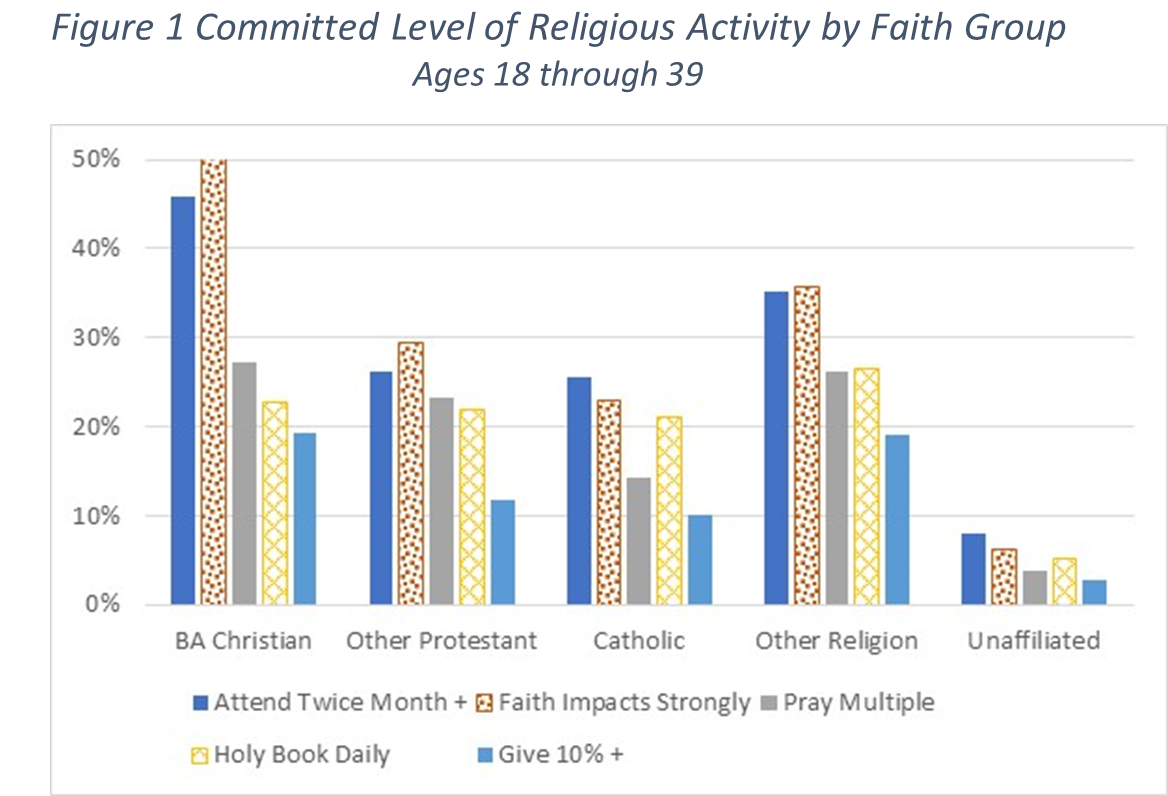
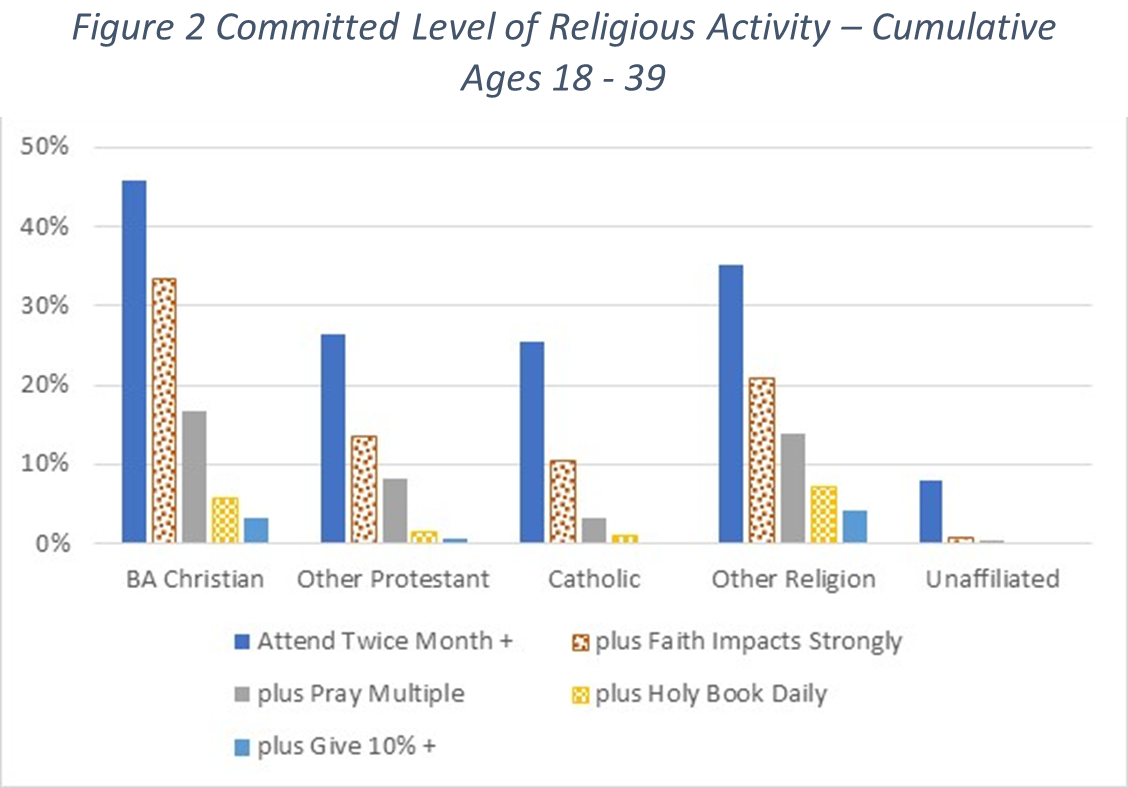
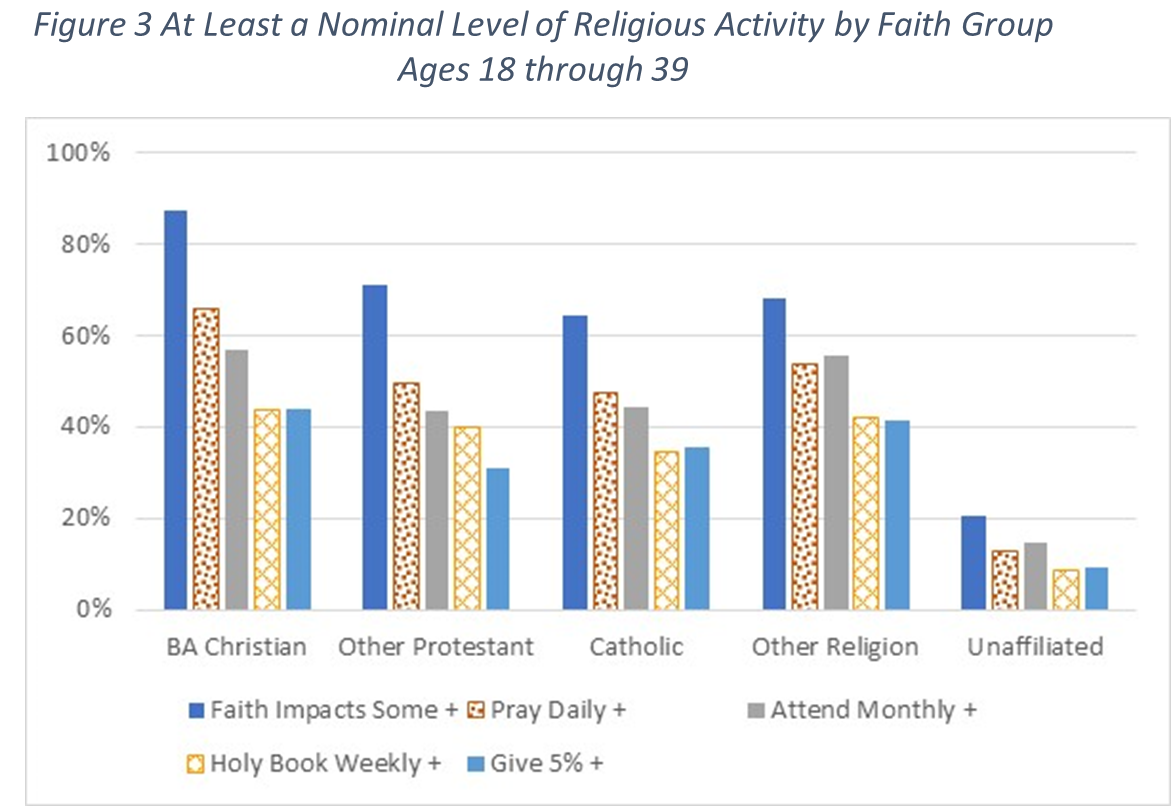 Nominal or Committed Levels of Religious Activity
Nominal or Committed Levels of Religious Activity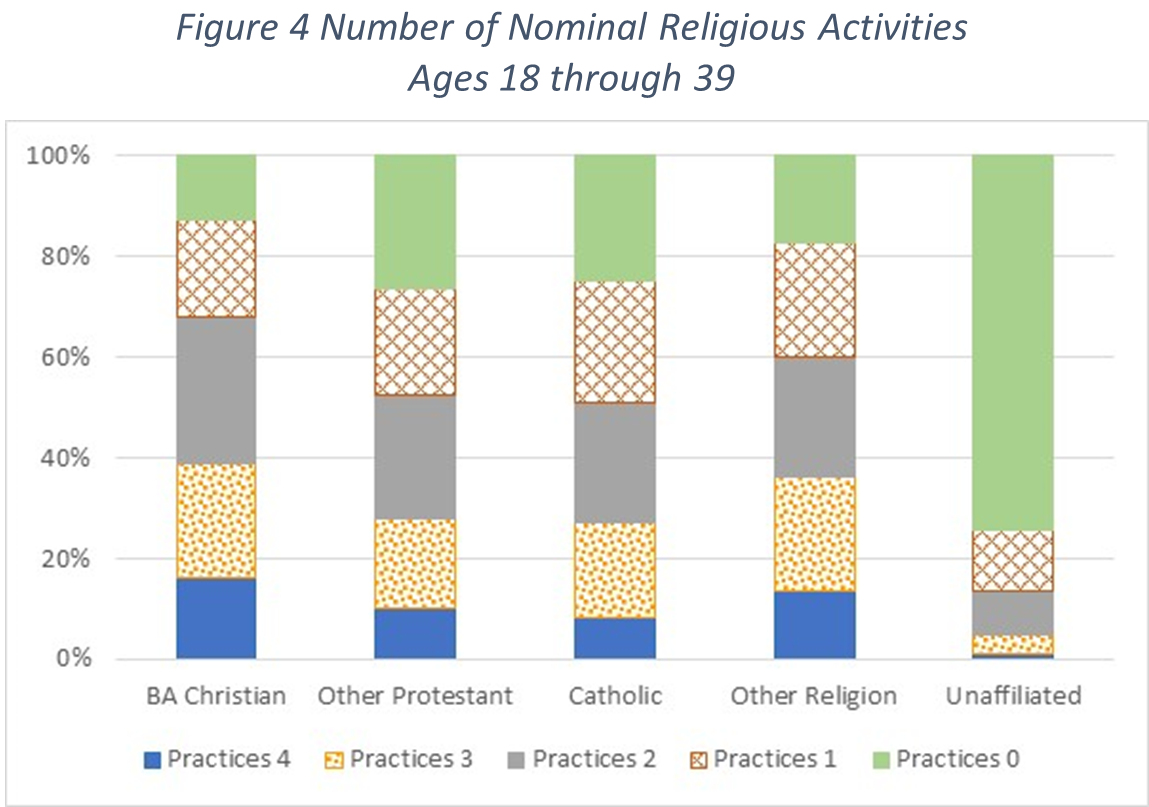
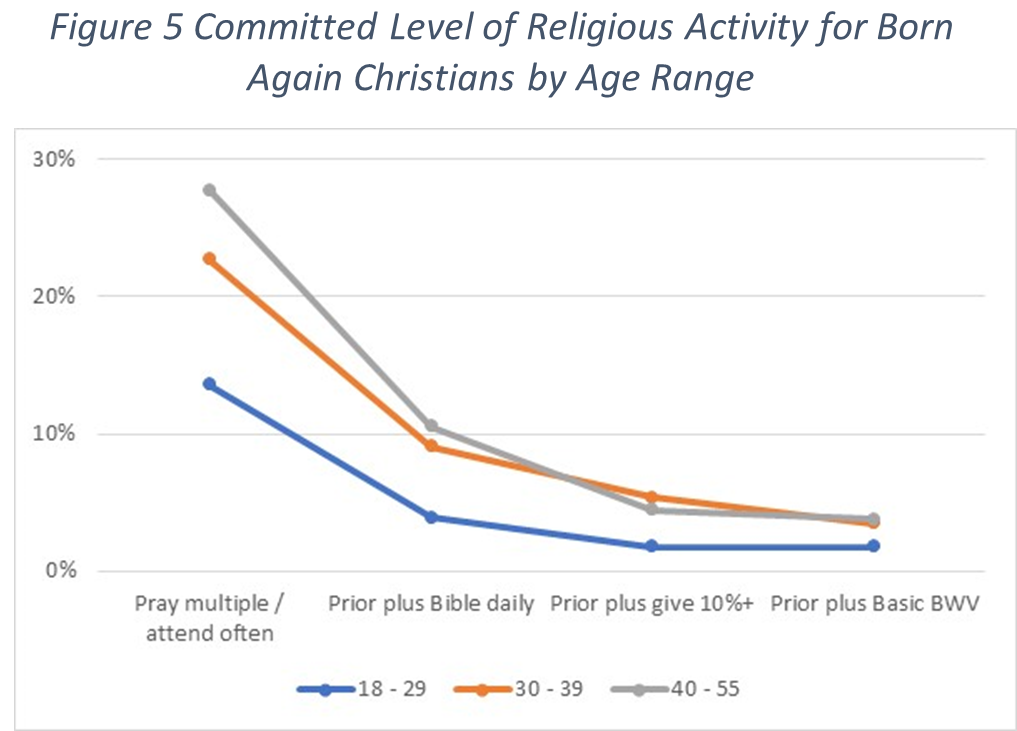
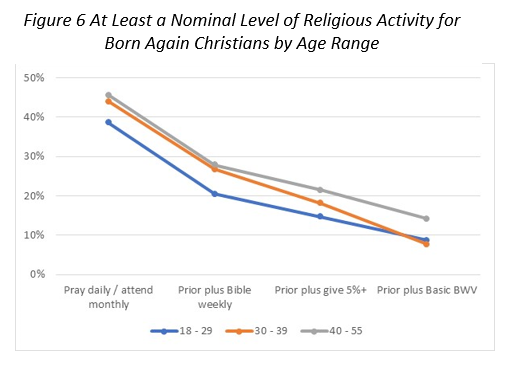
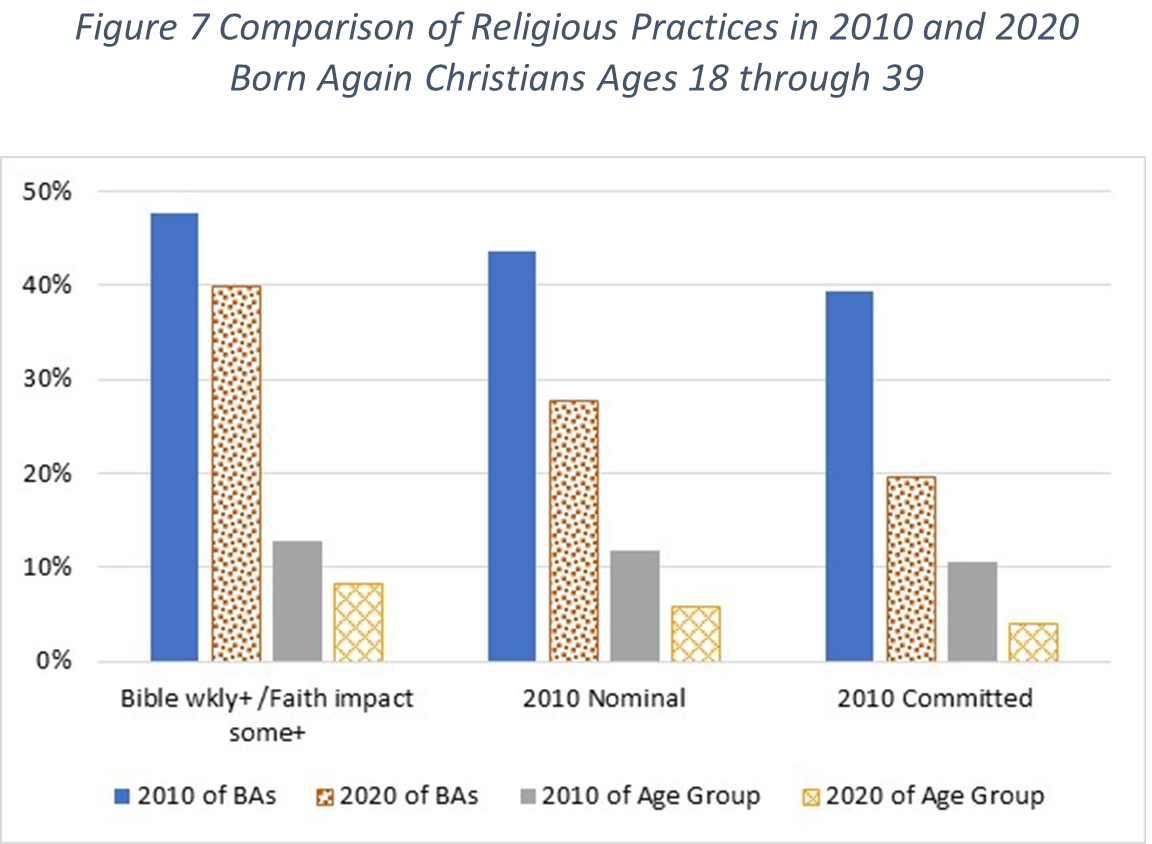
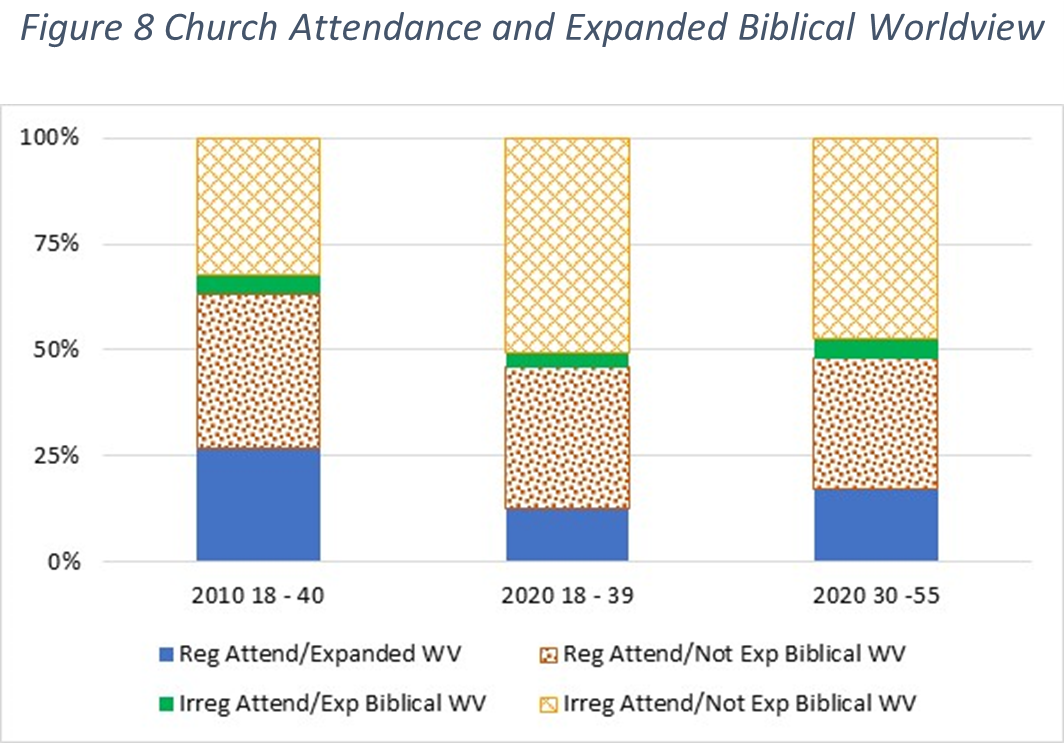 The figure on the left compares the findings from 2010 with those from 2020 using the more stringent Expanded Biblical Worldview. The values shown are the percent of Born-Again Christians (so all columns add up to 100% even though the percentage of Born Again Christians is less in 2020). Two age ranges are used in 2020; the first one is basically the same age range used in 2010 (18 – 39) and the second age range (30 – 55) is very close to the age range of the 2010 survey aged by the ten years that have gone by.
The figure on the left compares the findings from 2010 with those from 2020 using the more stringent Expanded Biblical Worldview. The values shown are the percent of Born-Again Christians (so all columns add up to 100% even though the percentage of Born Again Christians is less in 2020). Two age ranges are used in 2020; the first one is basically the same age range used in 2010 (18 – 39) and the second age range (30 – 55) is very close to the age range of the 2010 survey aged by the ten years that have gone by.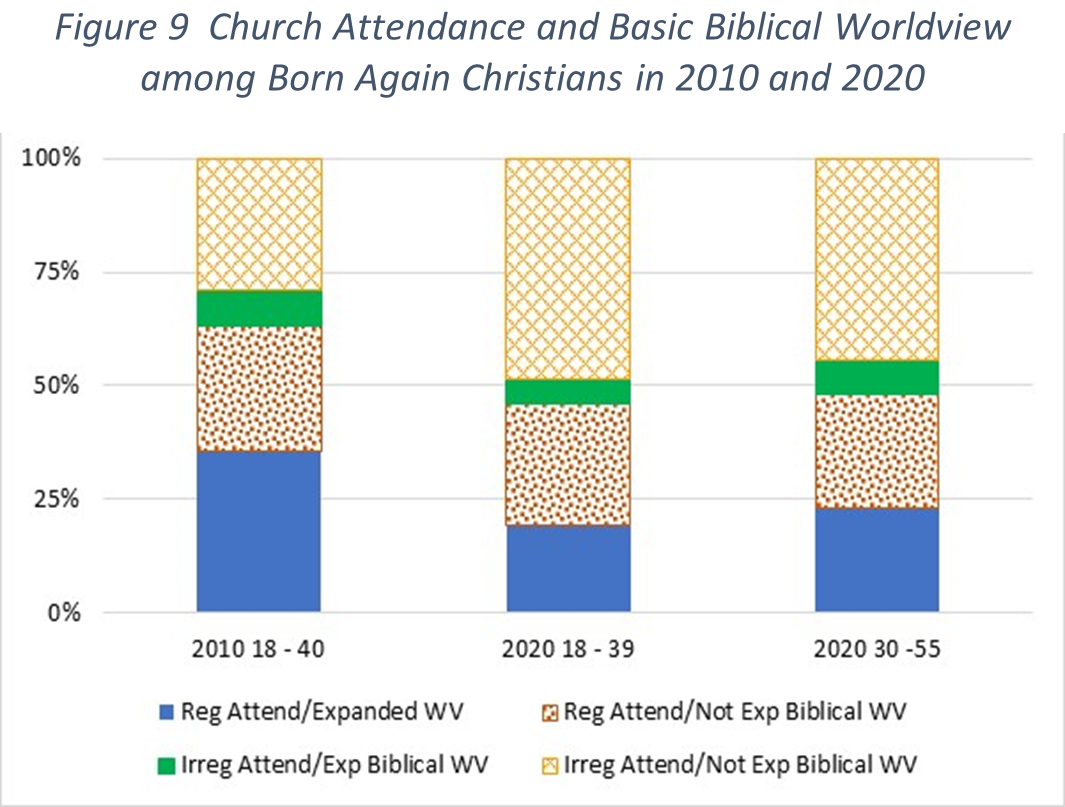 Now let’s examine the same chart using a Basic Biblical Worldview. We see nearly the same features as discussed above. A significant drop is shown in those with regular attendance and a Basic Biblical Worldview coupled with a significant increase in those with irregular attendance and no Basic Biblical Worldview.
Now let’s examine the same chart using a Basic Biblical Worldview. We see nearly the same features as discussed above. A significant drop is shown in those with regular attendance and a Basic Biblical Worldview coupled with a significant increase in those with irregular attendance and no Basic Biblical Worldview.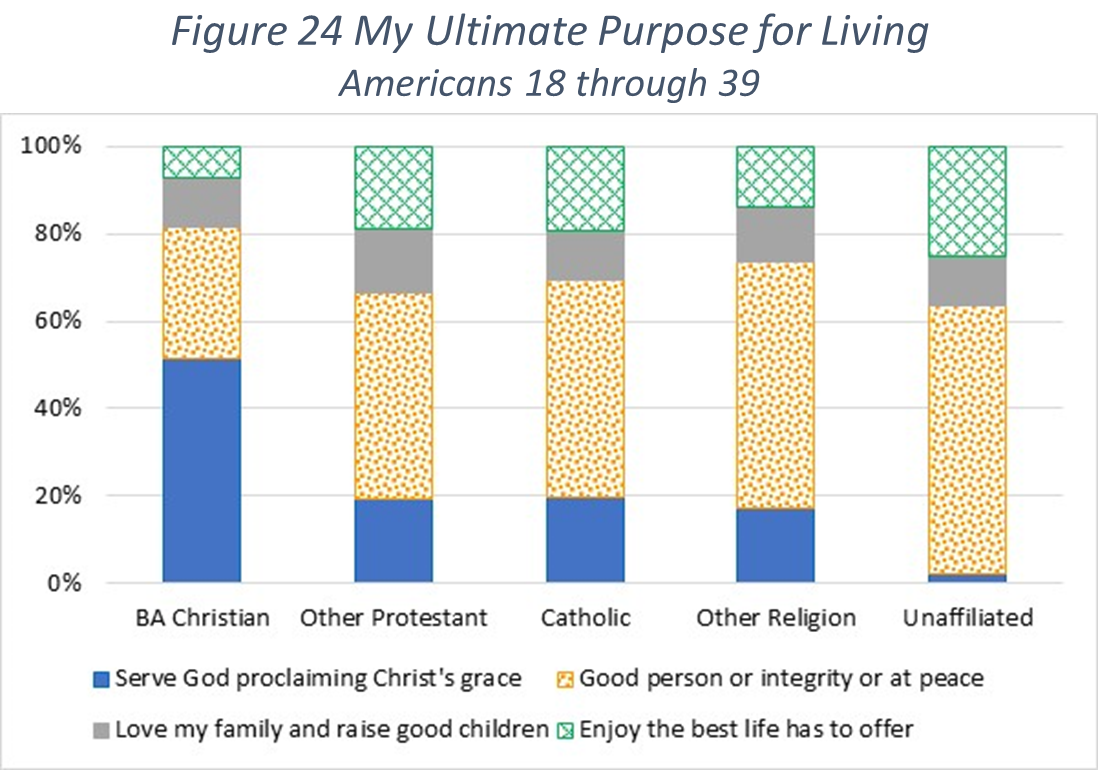 The results are charted in the graph to the left. As shown, just over half of Born Again Christians profess an eternal perspective. This means almost half do not, with most of those selecting a purpose that focuses on good behaviors in their personal life.
The results are charted in the graph to the left. As shown, just over half of Born Again Christians profess an eternal perspective. This means almost half do not, with most of those selecting a purpose that focuses on good behaviors in their personal life.